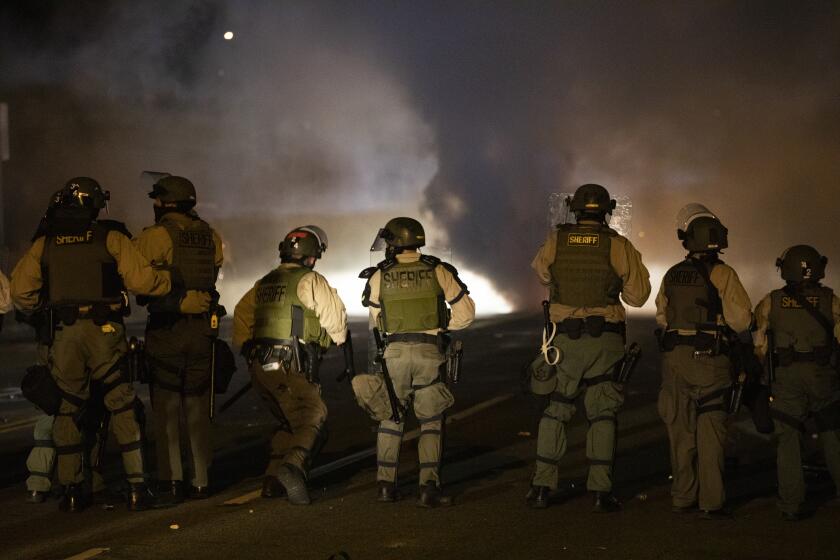A cadre of civil rights advocates rallied outside a downtown courthouse Thursday to demand accountability within the Los Angeles County Sheriffâs Department, which is embroiled in a lawsuit over recent oversight efforts to identify members of deputy gangs.
On one side: the deputiesâ union, which filed the suit in May, arguing that it would be unconstitutional to force deputies to show their tattoos to oversight officials investigating gangs operating within the department.
On the other side: the county, the sheriff and the Office of Inspector General, with support from the American Civil Liberties Union and the array of advocates who showed up before Thursdayâs hearing.
âThey are bullies, and what they are trying to do now is bully their way into not being held accountable,â Melina Abdullah, co-founder of Black Lives Matter Los Angeles, told the small crowd before a hearing on the case began. âThe harm they inflict on communities is not theoretical.â
Stephanie Luna â whose nephew was killed by deputies in 2018 â said the fact that the union filed suit to resist the Office of Inspector Generalâs investigation was a âa clear indication of the us-versus-them mentality.â
Following the initial lawsuit in May, Los Angeles County Superior Court Judge James Chalfant awarded the union a temporary restraining order barring the county from requiring deputies to show their tattoos to investigators with the Office of Inspector General.
Thursdayâs court date was scheduled to hear arguments about whether the restrictions outlined in that restraining order should stay in place. The judge said he will not issue a ruling until at least next week.
For several decades, the Sheriffâs Department has faced allegations about secretive deputy groups running amok in certain stations, controlling command staff and promoting a culture of violence. Some of the most infamous of those groups are commonly known as the Executioners and the Banditos, which operate out of Compton and East L.A. stations, respectively.
Members of the former are alleged to sport tattoos of a skull with Nazi imagery and an AK-47, while members of the latter are allegedly known for their matching tattoos of a skeleton outfitted with a sombrero, bandoleer and pistol.
As part of an effort to identify members of those groups, in May the Office of Inspector General sent letters to 35 deputies suspected of being members of either. The letters directed recipients to submit to questions, show the investigators their tattoos and name any deputies with similar ink.
Because the inspector general is separate from the Sheriffâs Department, it was initially unclear whether there would be consequences for deputies who refused to cooperate with the letters. Sheriff Robert Luna sent a department-wide email that month, ordering his staff to comply with the inspector generalâs request or face the possibility of discipline or termination.
The Assn. for Los Angeles Deputy Sheriffs, a union representing sheriff deputies, filed a lawsuit arguing that ordering deputies to cooperate with the investigation and show their tattoos would violate California law as well as the 4th Amendment ban on unreasonable searches and the 5th Amendment protection against self-incrimination.
This week in court, Chalfant questioned both parties about the labor issues and constitutional claims in addition to wrestling with legal concerns relating to what oversight officials would be allowed to do with the results of any interviews conducted.
âWhat gave me pause as I read was these Serpico situations where deputies donât have each otherâs backs unless theyâre members of a law enforcement gang,â Chalfant said. âThat is criminal behavior, I think.â
Because membership in a law enforcement gang is not a crime â though it can be grounds for termination â the judge questioned whether the 5th Amendment would apply if deputies were required to show their tattoos and answer questions.
And, while the unionâs attorneys maintained that being forced to show their tattoos would be an âunreasonable searchâ in violation of the 4th Amendment, lawyers for the county explained that theyâd narrowed the scope of the proposed investigation to focus on tattoos in visible places such as the face, neck and below the knee.
Throughout the hearing, the judge expressed concerns about the allegations surrounding deputy gangs. And even though he did not rule on the issue of whether to leave in place the restrictions outlined in the restraining order, he did approve the inclusion of a third-party brief filed by the ACLU of Southern California, Check the Sheriff, Dignity and Power Now, and the California Immigrant Policy Center.
âALADS to continue to shield deputy gang members by granting an injunction would cause significant harm to the community,â the organizations wrote, âand given the absence of any articulable harm to ALADS, the balance of those harms weighs heavily against ALADSâs requested injunction.â
In a statement emailed to The Times on Friday, union President Richard Pippin criticized the ACLU for supporting the push to force deputies to reveal their tattoos.
âSome of us are old enough to remember a time when the ACLU fought to protect the privacy rights of all Americans, understanding that a successful attack on anyoneâs rights can lead to an erosion of everyoneâs rights,â he said.
Citing pending litigation, lawyers for the county declined to comment.











